Tackling the Root Causes: Food Insecurity and Forced Migration in Latin America
By Julia Davatzes and Emma Wright
The World Food Program estimates that more than 309 million people face acute hunger in 71 countries in 2024. The global hunger crisis is driven by overlapping and escalating factors including conflict, climate disasters, and economic shocks. People who do not have enough food to feed their families will make decisions out of desperation, whether to stay in or migrate from the region.
With 120 million people forcibly displaced by conflicts and wars globally, the “world is bleeding everywhere,” reflected John Thon Majok, Director of the Refugee and Forced Displacement Initiative, who moderated the event. As poverty, violence, natural disasters, hunger, and other factors continue to drive people away from their homes, their impacts are felt everywhere. Majok noted that instability and disaster-related factors “contribute to the disruption of systems, leading to food insecurity, which produce hunger, and the cycle continues.”
On October 9, the Refugee and Forced Displacement Initiative (RAFDI) hosted a public event, “Tackling the Root Causes: Food Insecurity and Forced Migration in Latin America,” where speakers discussed the linkage between hunger and migration; role played by different actors including faith-based organizations; and sustainable solutions to tackle this issue. Both the Los Angeles Declaration on Migration and Protection and the Global Compact for Migration underline the importance of addressing the key drivers and structural factors that force people to leave their homes. Migration within and from Latin America is multifaceted and is driven by factors that include food insecurity.
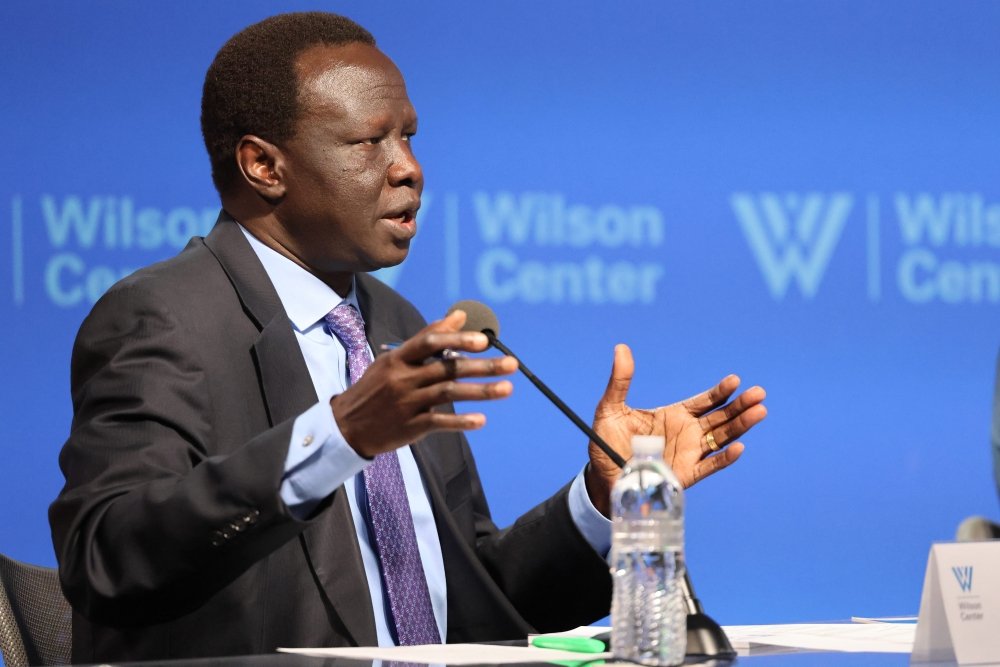
Key Themes on Food Scarcity and Migration in Latin America
The event brought together experts from food security policy, program implementation, faith-based organization, and immigration law arenas to discuss migration and food insecurity intersections in Latin America and their relevance to global trends. Below is a summary of key takeaways from the panel discussion.
Partnerships with and Accountability to Affected Populations
Engaging affected populations throughout the policy and program cycles of aid is vital to ensuring assistance is timely, appropriate, and effective in addressing food insecurity. The panel experts encouraged humanitarian actors to build partnerships with and establish mechanisms to remain accountable to affected communities and local organizations, echoing many of the localization commitments of The Grand Bargain. Scott Weatherford, Founder of Building Lives Network, spoke about the importance of collaborating with indigenous leadership and providing skills-based programs to communities. He provided the example of how his organization focuses on “training and equipping leaders… to give them the tools they need to transform their communities,” and thus empowering them to direct their own services. Donors should finance local organizations and leaders directly instead of relying on funding to trickle down through multi-lateral institutions and international intermediaries.
The speakers noted the importance of recognizing the variability of affected communities and their specific needs. For example, the “Northern Triangle” — El Salvador, Guatemala, and Honduras — has high levels of out-migration in the region. And while the event discussion spoke about regional trends, each of these areas has distinct histories and contexts of food insecurity that drives migration. Carrie Seay-Fleming, Postdoctoral Research Associate at the University of Arizona, noted the importance of recognizing regional, state, and community nuances that affect the drivers of food insecurity and migration and the appropriate programs to address them. Aid actors should continue to engage and co-create solutions with local communities to ensure programming is aligned with their specific contexts.
Initial alterations to the Feed the Future program, the primary US Agency for International Development (USAID) effort to address food insecurity, exemplify how food aid policies can adapt to better meet local needs. Seay-Fleming detailed Feed the Future’s investments in local food sovereignty initiatives and projects that align with local and indigenous agricultural practices in Guatemala. These adaptations to funding structures and programming resulted in part from social movements, like food sovereignty and campesino movements, that demanded change. She reflected how this initiative and other development programs should continue to evolve to meet the needs of vulnerable communities.
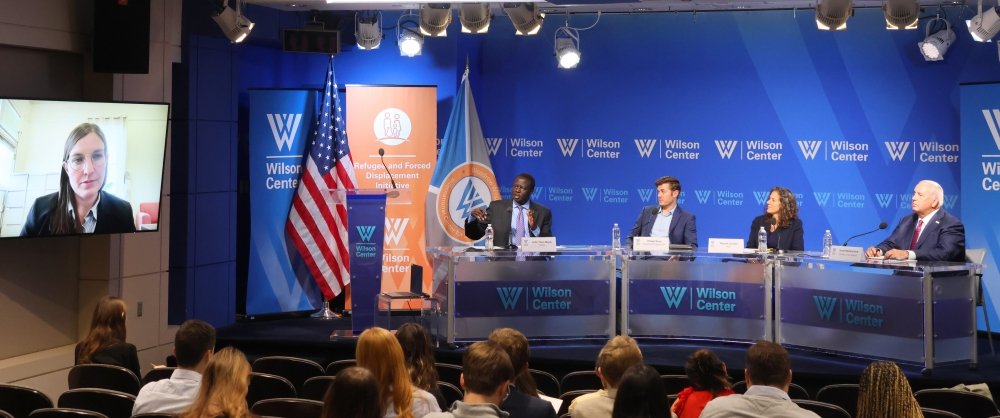
Multi-Faceted Drivers and a Full Ecosystem of Solutions
Food insecurity and migration do not exist in a vacuum, but rather within the context of other underlying factors that drive these crises. Experts reinforced how traditional farming practices, gender norms, climate change, and underlying poverty levels can all give rise to food insecurity. Similarly, food insecurity, violence, and lack of economic opportunity can all drive migration. “No drivers work in isolation,” Seay-Fleming emphasized.
Additionally, the drivers of migration in Latin America are not constrained to the region. Rachel Levitan, Chief Global Policy and Advocacy Officer at HIAS, noted how migrants are flying from other regions to Latin American states that have favorable entry policies, and then trying to migrate through Latin America and the Darién Gap. As such, global drivers of displacement also affect migration in Latin America.
Just as food security and migration challenges do not exist in a vacuum, neither do interventions. Experts urged humanitarian aid organizations, such as HIAS, to consider the “full ecosystem” of solutions, as Levitan phrased it, when addressing migration, including food, economic, good governance, healthcare, gender-sensitive programming, protection, and other services.
Intersection of Gender and Food Security
“Food insecurity and gender inequality are inexplicably linked,” Levitan noted. In a report published by the Food and Agriculture Organization (FAO) in coordination with other UN and multilateral agencies, women and girls have a 30% greater chance of experiencing food insecurity than men and boys. This connection between food and gender is often overlooked due to fundamental inequality in community structures. Gendered cultural expectations and roles, high levels of unpaid labor, inequitable distribution of decision-making authority, and restricted access to resources and information about resources leaves women and girls more vulnerable to shocks and contributes to food insecurity and other drivers of displacement.
Levitan recommends that humanitarian programs “mainstream gender protection into current modalities of assistance.” Engaging women and girls throughout the program cycle, including in the design, implementation, and evaluation and core program decisions, will enhance the impact of food aid programs in Latin America.
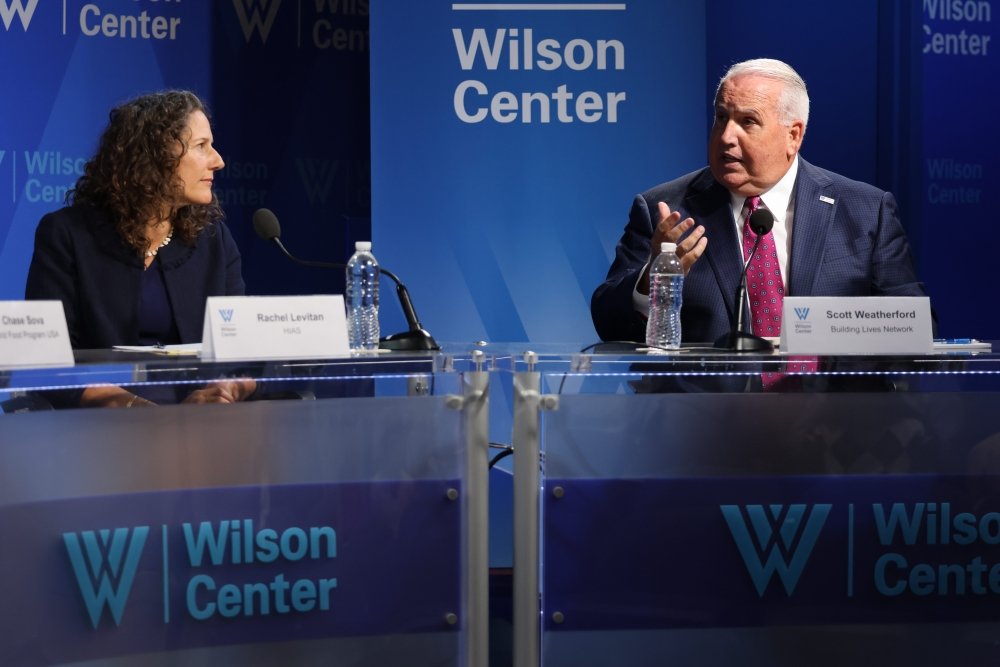
Shaping the Narrative on Migration
Experts reflected on the dangers of misinformation regarding refugees, migrants, and host communities. Chase Sova, Senior Director of Public Policy and Thought Leadership at World Food Program USA, reflected that “there’s an idea that people migrate purely on basis of opportunity,” which inadequately recognizes the contextual factors of displacement. Changing the policy and political narratives to focus on the drivers of migration from a location is critical to designing programs that address the root causes of migration.
Additionally, political focus on smuggling has threatened the work of frontline humanitarian organizations accused of facilitating illegal transport of refugees. “Displacement and migration are here to stay,” Levitan reflected. There is a present need to dispel this misinformation and disproportionate focus on smuggling and refocus political energy on the intersectional drivers and solutions to the issues. Levitan encourages the international aid agencies to “educate members of [the US] Congress and others that are vilifying the organizations that are trying to help people and people on the move themselves.”
Changing the narrative around refugees themselves is increasingly important, especially efforts to demonstrate that migrants are more than a number. Weatherford claimed that “numbers can be cold,” but stories expressing the individuality of displaced persons’ experiences hinders rhetoric that reduces people in groups to numbers. This shift in the language surrounding refugees represents an important shift in focus for policymakers and the public and may help garner appropriate attention and respect for displaced and migrating individuals.
Inadequate Funding and Misaligned Policies
Policymakers must not fail to give adequate attention to the root causes of migration in Latin America, especially as significant displacement crises continue in Gaza, Sudan, Ethiopia, Syria, Yemen, and most recently Lebanon. Sova noted, “We are an order of magnitude off with the resources we are applying to the problem.”
The US Congress has demonstrated that it cares about global hunger as it usually authorizes funding for food and displacement programs, including supplemental appropriations to Ukraine and Gaza for food assistance. But funding for food security needs to increase in magnitude and be allocated on a more regular, proactive basis. Additionally, implementing holistic solutions to displacement also includes changes to policies of migrant host communities. Levitan recommended comprehensive immigration reform to “uphold the basic rights of asylum seekers and displaced populations” arriving in the United States from Latin America.
How do we effectively bring awareness to lawmakers on these issues in Latin America and enact policy changes on behalf of displaced populations? Sova categorized approaches to encouraging policymakers to address food insecurity as three appeals: 1) a moral imperative to care about global hunger; 2) an economic benefit to build markets for American consumers and products; and 3) the potential risks to national security if unaddressed. Framing policy changes around these motivations will help draw focus to the critical issues of food insecurity and migration in Latin America.
During the event, Sova referenced a quote by the former Executive Director of the World Food Program Josette Sheeran to illustrate the desperation and difficult decision made by food insecure populations: “Hungry people do one of three things: they revolt, they migrate, or they die.”
Policy Recommendations
Issues of food scarcity and migration in Latin America require policy, funding, and programmatic attention. The panel offered the following policy recommendations:
- Co-create solutions with local communities, engaging them throughout the program planning and implementation process, to ensure programming is aligned with their specific needs and contexts.
- Establish and maintain mechanisms for humanitarian aid actors to remain accountable to affected communities and local organizations.
- Administer humanitarian funding directly to local organizations and displaced people.
- With renewed political energy, address food insecurity and migration with the full ecosystem of solutions, with programming across all sectors.
- Mainstream gender protection and gender-sensitive components into food security programming.
- Educate policymakers and the public about refugees and the humanitarian aid organizations supporting them to help dispel misinformation.
- Increase funding for food security and migration programming and establish regular, proactive allocations.
Effective changes to food and migration policy and programs will ensure peace and safety for people in Latin America and around the world.
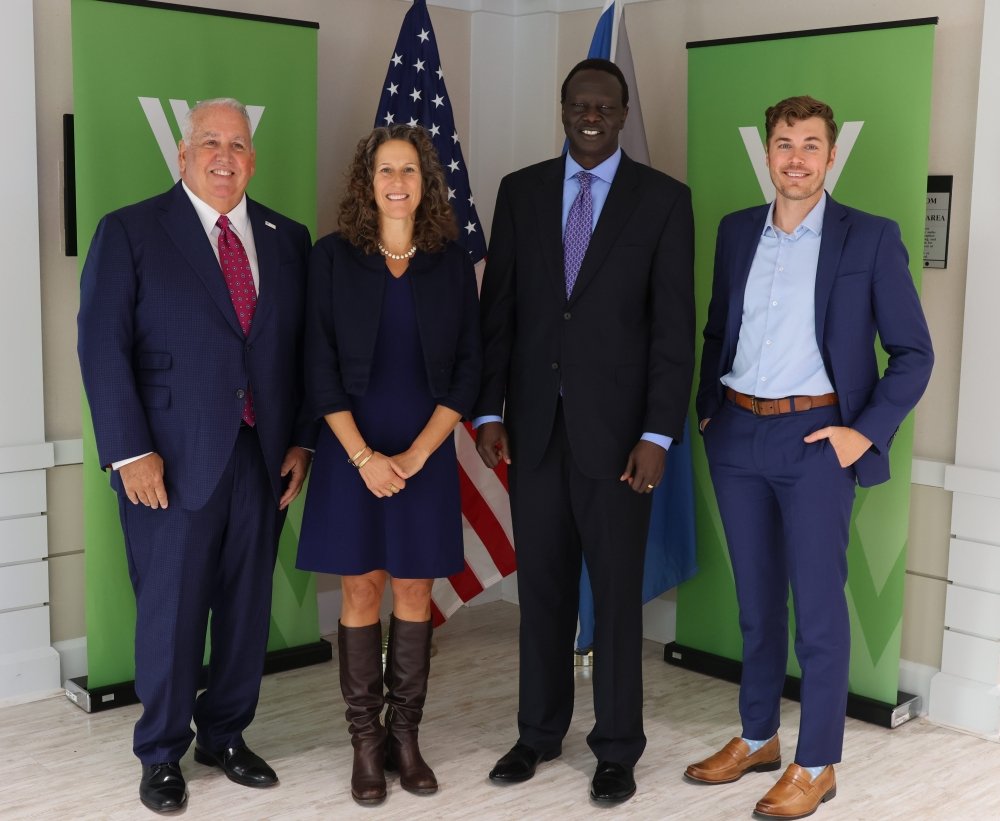
Speakers




Moderator
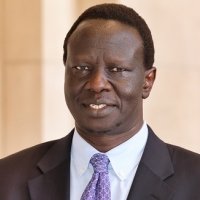
Hosted By

Refugee and Forced Displacement Initiative
The Refugee and Forced Displacement Initiative (RAFDI) provides evidence-based analyses that translate research findings into practice and policy impact. Established in 2022 as a response to an ever-increasing number of people forcibly displaced from their homes by protracted conflicts and persecution, RAFDI aims to expand the space for new perspectives, constructive dialogue and sustainable solutions to inform policies that will improve the future for the displaced people. Read more


Latin America Program
The Wilson Center’s prestigious Latin America Program provides non-partisan expertise to a broad community of decision makers in the United States and Latin America on critical policy issues facing the Hemisphere. The Program provides insightful and actionable research for policymakers, private sector leaders, journalists, and public intellectuals in the United States and Latin America. To bridge the gap between scholarship and policy action, it fosters new inquiry, sponsors high-level public and private meetings among multiple stakeholders, and explores policy options to improve outcomes for citizens throughout the Americas. Drawing on the Wilson Center’s strength as the nation’s key non-partisan policy forum, the Program serves as a trusted source of analysis and a vital point of contact between the worlds of scholarship and action. Read more


